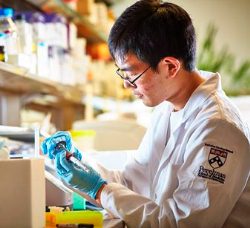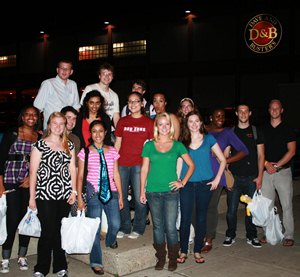The Program
Laboratory Research
 Individual hypothesis-driven research is the core component of the SUPERS program. Accepted students will perform relevant research under the direct guidance of their faculty mentor and direct supervisor. Students will: gain a functional understanding of the hypothesis behind their individual project, learn and perfect the skills and techniques needed to carry out experiments, and analyze and process data collected in the laboratory. As testament to the quality of the research done by past SUPERS students, is the ever growing list of peer reviewed publications which list at least one of our alumni as coauthor.
Individual hypothesis-driven research is the core component of the SUPERS program. Accepted students will perform relevant research under the direct guidance of their faculty mentor and direct supervisor. Students will: gain a functional understanding of the hypothesis behind their individual project, learn and perfect the skills and techniques needed to carry out experiments, and analyze and process data collected in the laboratory. As testament to the quality of the research done by past SUPERS students, is the ever growing list of peer reviewed publications which list at least one of our alumni as coauthor.
Lectures
Lectures led by UPenn faculty are given weekly. These include topics on the principles of cancer cell biology, tumor physiology, radiation biology, physics, radiologic imaging, ethics in science, AI, as well as career guidance. The primary goal of these lectures is to build a foundation for students to understand how their research project fits into the broader picture, and for them to discover new paths in science!
The weekly lectures covered many topics that were not discussed in any of my undergraduate biology classes, these lectures contributed significantly to my understanding of my individual research project and my understanding of cancer and radiation biology as a whole.
Joe Benci, PhD – SUPERS 2010, 2011
Journal Clubs
Keeping up with the scientific literature is essential for all research scientists. In journal club, timely and relevant journal articles are discussed. Journal club is student led in order to promote confidence in the student's ability to comprehend seemingly complex scientific papers.
Presentations
Students are given two opportunities to present their project to their peers and other members of our research community. Students present their hypothesis, background information and research plan at mid-summer chalk talks. Then they present power point presentations, focused on research results and conclusions at a day long end of summer retreat.
Housing

Students are housed communally in one of the dormitories on Penn’s campus. Typically each dormitory suite contains four single rooms around a shared kitchen and living area. The dormitories are located approximately 15 minutes, by foot, from the department's research laboratories. The SUPERS program hosts a variety of social activities over the course of the summer.
While enrolled as a SUPERS student, you will spend the summer in Philadelphia and get to explore the city and even have some non-science related fun!

